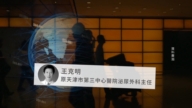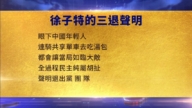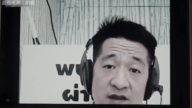【新唐人2011年10月19日讯】中国又开始一场网络公民运动。博客作家发起的“不跟你玩”运动,主张互联网开展政治不合作运动的非暴力抗争,宣告与执政者不合作姿态。也就是网民透过网络宣告他们的公民权利运动。
现在看到的就是“不跟你玩”的标识。只要将“不跟你玩”的标识图案叠加到自己的网路头像上,并找到志同道合的朋友,知道谁是“自己人”。
博客作家北风发起的这一项“不跟你玩”网络新运动,希望参与者通过共同立场的表达,对执政者构成现实的压力。只要认同普世价值的人都可以参与。
“不跟你玩”行动指引中提示参与者,将普世价值作为自己思考和行动的价值判断基础﹔尽可能抵制与普世价值相违背的事物﹔并向其他人传播“不跟你玩”非暴力不合作理念。
而“与执政者不合作”中的“执政者”,指的是参与所在国家的执政者﹔活动内容是不与执政者及具有执政者背景的机构有任何合作,包括不替他们工作,不从他们手中获取研究专案及经费,不与他们有任何商业往来,不附和及参与他们发起的任何活动。
前《中国民营》杂志记者专栏作家刘逸明:“如果说中国一大半人或者是非常非常多的人,尤其是精英阶层的人,能够做到跟当局尽量的不合作,我想这个力量就会很大。”
北京维权律师唐荆陵也表示,非暴力合作运动几乎都是由普通民众发起,体制内的精英往往先观望再行动。
唐荆陵律师:“非暴力合作运动它首先是普通民众合法参与的,风险也不高,但是它对于体制内的精英呢,他是很难参与的,因为体制内的精英一开始不合作,可能会付出很多代价,对他来说也没有什么收益,但是当民众的合作变成十分庞大的时候,体制内的精英才会考虑跟着民众走。”
唐荆陵律师还表示,虽然中共严厉控制言论自由,但当这种自由的言论,从量上达到一定的程度之后,就会改变舆论的环境。
唐荆陵律师:“今天在中国,互联网已经发展到现在这样的地步,一个是网民数量的迅速增加,二是网民权利意识的迅速社会觉醒,对这个社会危机感大家都很清楚,在网络的发言方面,大家也都很开放,但是对于当局来讲,言论控制依然很严。”
“不跟你玩”运动还张贴风险提示,提醒网友这个运动与结社无关,在其他国家的法律里,并没有规定这是非法行为。但不排除在中国这类的国家中,参与类似的行为可能会受到警察的骚扰和警告。
唐荆陵律师:“因为我们要观察,那些因为这个很彻底的非暴力革命而发生变化的国家,这方面最典型的国家,那就是六十年代的美国,然后就是八十年代的南非,再有就是20-40年代的印度,这三个国家是最典型的,因为他的社会转变,是十分彻底的,同时他在坚持非暴力原则方面也贯彻的相当到位,你观察这些国家,就是非暴力革命给这些国家带来的改变,那就可以看到,如果中国也发生一场类似的非暴力革命的话,那么中国真的可以成为令人尊敬的国家了。”
2011年是辛亥革命一百周年。中国的网络行动正逐渐成为中国公民行动的一股重要力量,公民参与是否渐渐成为共同塑造未来中国的一个趋势,我们将持续观察。
新唐人记者张丽娜、黄容、王明宇采访报导。
Chinese Netizen Starts the “Not Playing With You” Movement
Another Internet civil rights movement
has just started in China.
A Chinese blogger started the “Not Playing With You” movement,
a non-violent online protest against China’s ruling authorities.
In other words, netizens have started
an Internet civil rights movement.
What you see right now is the symbol or logo of
the “Not Playing With You” movement.
By using this icon as your profile image,
people in the movement can easily identity fellow members.
Blogger Beifeng is the founder of this new online movement,
which provides members a platform for expressing their personal views,
which will hopefully put pressure on the rulers of
the Chinese Communist Party (CCP).
Anyone who believes in universal human rights
can participate.
The “Not Playing With You” guidelines state that
fundamental human rights are the basis of correct thinking and actions.
The movement encourages its members to resist doing things
that undermine universal human rights and to share non-violent concepts with others.
The protest specifically targets state “ruling officials.”
The goal of the movement is for members to
not have any involvement with anyone with a “ruling official” background,
including not working for them, not getting funding from them,
not doing business with them, and not participating in any event initiated by them.
Author and former China Civil Front reporter, Liu Yiming:
“If the majority of people in China,
especially the elites, stop working with the regime,
I think it will be very powerful!”
Beijing human rights lawyer, Tang Jingling,
commented that non-violent movements are usually started by common citizens.
The elites usually observe first, and then act later.
Tang Jingling: “Non-violent movements are legal
for normal citizens to participate in, so the risk is not that high.
But it is hard for the elites of Chinese society to participate,
as they will likely be punished.
In addition, there is no direct benefit in it for them.
However, only when a lot of citizens join in these movements,
do the elites even consider joining.”
Tang Jingling said that while the CCP strictly controls
free speech,
when this freedom of speech ideology grows to a certain extent,
an environment starts to naturally form.
Tang Jingling: “In today’s China, the Internet is very developed.
The number of internet users has steadily increased and
netizens are starting to realize their civil rights.
Everyone feels a sense of social unrest,
and everyone is quite openly talking about it online.
But the regime still maintians very strict
control over speech and press.”
The “Not Playing With You” movement posted a warning
saying that although engaging in non-violent Internet activities is legal in most countries,
in China, participants could be harassed or
threatened by police.
Tang Jingling, “We just need to observe the many countries
which were changed by prominenent non-violent movements,
including the U.S in the 60s, South Africa,
and India between 1920 to 1940.
The changes that occurred in their societies are very apparent,
as their non-violent ideals were put into practice.
By looking at these countries, one can see the vast changes
that these non-violent revolutions brought to society.
And if simliar a revolution happened in China,
then perhaps China might evolve into a real country, as well.”
During this year’s 100th anniversary of the Xinhai Revolution,
it is easy to see that the Internet is gradually evolving into
an important force for civil movements in China.
Whether this trend will be able to provide the needed strength
to forge a new China, well…we’ll just have to wait and see.
NTD reporters Zhang Lina, Huang Rong and Wang Mingyu




























